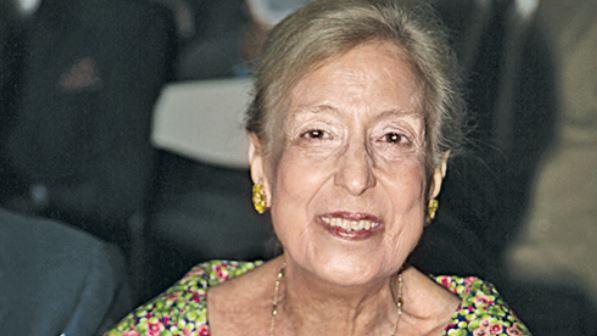A tribute to Matrona Xylas Egon by Professor Judith Herrin
Matrona Egon, née Xylas, always known as Matti, filled any room she was in with her warm smile and friendly greeting that I recall as a very particular characteristic. As well as a patient capacity to listen politely, she expressed her own opinions in a clear forthright manner, which made conversations lively and interesting. This special skill in combining a generous toleration of views she found reprehensible and highly intelligent responses to such views set a very high standard. Always welcoming, she encouraged a sense of ease and inclusiveness with a most ‘graceful presence’ as Gonda van Steen puts it. But as the daughter of a famous Greek shipowner, you knew she would have run the business brilliantly.
From the age of twelve Matti was educated in England and alluded frequently to her gratitude to University College London for deepening her love of Greek literature, yet she remained very rooted in her island of Chios, the home of both her parents. Michael Xylas and Stamatia Poutous were the children of Greek families in Chios, where Michael had begun his education while it was still under Ottoman rule. Matti always cherished and sustained her island heritage. With her second husband, the Hungarian painter, Nicholas Egon, she extended her parents’ philanthropic activities and investment in the cultural life of Chios. The primary school Michael had attended at Kardamyla became a cultural centre, and the Homerion, created in the 1970s was later expanded and then donated to the municipality in 1985.
I first became aware of this very beautiful and extremely impressive woman in the early 1990s when I returned to King’s College London from Princeton University to take up the chair of Late Antique and Byzantine Studies. Professor Averil Cameron, my predecessor, had already established close relations with Matti and Nicholas, who had supported the Centre for Hellenic Studies which she set up at King’s. Nicholas had proposed and funded the Runciman lecture, which became an annual celebration of Sir Steven and the most important event in the Centre’s calendar. Over the years Matti and Nicholas helped in the selection of the lecturer, arranged the magnificent floral decorations in white and blue and provided the lavish buffet for the entire audience. In this way the Centre consolidated its hundreds of loyal supporters, who made special visits to London for the lecture.
Their patronage made a huge difference to studies of Hellenic culture of all periods, not only at King's College London, but throughout the UK. Matti’s particularly enthusiasm was for the Greek Archaeological Committee, which she endowed to encourage Greek/Cypriot students to study in the UK. I was very happy to serve on its committee and greatly admired the way Matti would question the applicants' qualifications, the originality of their projects and capacity to achieve their aims. She also noted when they might have financial difficulty in sustaining their postgraduate studies and made additional grants to individuals on top of the generous bursaries they received. These top-up grants were especially appreciated by students who were writing up their PhD research. In recent years, those who gained bursaries and such grants attended the annual GAC lecture at King’s and informed the audience of their interests. The list of university teachers, members of the Greek and Cypriot archaeological services and other researchers who benefitted from these grants is an impressive roll call of current experts.
It was therefore most appropriate that Matti and later Nicholas were honoured with election to the Fellowship of King’s College London, at ceremonies that preceded the regular distribution of degrees. After attending so many dinners hosted by them at the Athenaeum for the Runciman lecturer, it was a very special delight to see them sitting at the top table with the College Principal, Chair of Council and other distinguished guests. They were a truly impressive 'power couple'; philanthropists of the highest order and such good fun as well. Matti would tease Nicholas when he started to get exercised about politics, while he complained at the time she spent looking after the villagers who lived near them at Katakali in the Corinthia. How deeply we will miss them.
An article on Matti Egon printed in 28.09.2014 in Kathimerini on the event which celebrated Matti's 16 years as founder and honorary president of the Greek Archaeological Commission of Great Britain. Plus the article that was printed on Tuesday 20 October also in Kathimerini, paying tribute to Matti's life.


Comments powered by CComment